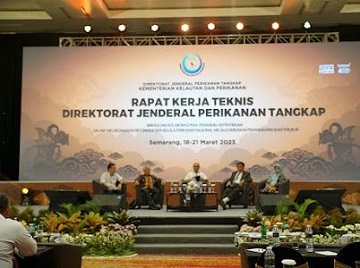Prof Indra Jaya Speaks About the Potential of Fish Resources at the Technical Work Meeting of the Ministry of Maritime Affairs and Fisheries

One of the IPB University lecturers from the Department of Marine Science and Technology (ITK), Faculty of Fisheries and Marine Sciences (FPIK), Prof Indra Jaya was invited by the Directorate General of Capture Fisheries, Ministry of Maritime Affairs and Fisheries to the 2023 Technical Work Meeting (Rakernis) in Semarang, Central Java.
On the agenda for this Rakernis, Prof Indra who is also Chairperson of the National Commission for the Study of Fish Resources (Komnas Kajiskan) was asked to present several points regarding Indonesia's potential fish resources (SDI). He also explained the policy options for managing SDI including the potential, level of utilization and health of SDI as well as measurable fisheries policies and sustainability of SDI.
"The Republic of Indonesia's Fisheries Management Area (WPP-NRI) intersects other areas such as the Indian Ocean and the Pacific Ocean. Therefore, the management of SDI in Indonesia runs synergistically with several regional fisheries management organizations around Indonesian waters," said the Professor of IPB University.
Regional fisheries management organizations (RFMO) located around Indonesian waters include the Indian Ocean Tuna Commission (IOTC), The Western and Central Pacific Fisheries Commission (WCPFC) and The Commission for the Conservation of Southern Bluefin Tuna (CCSBT).
"There are three WPP areas that intersect with the IOTC area, two WPP areas intersect with the WCPFC and six areas that are still in Indonesian Archipelago waters," said Komnas Kajiskan Chairman when delivering his presentation at the Gumaya Tower Hotel Semarang, Central Java some time ago.
He added that the study of fish stocks in Indonesia was carried out based on the grouping of fish species including small pelagic, large pelagic, demersal, reef fish, shrimp, lobster, crab, crab and squid in the fisheries management area (WPP).
The main output of the SDI study is the maximum sustainable yield (MSY) which indicates the maximum amount of catch allowed so that the availability of capture fisheries resources remains sustainable. "In several WPPs it can be seen that certain groups of fish have experienced overfishing or overfished," explained Prof Indra.
According to him, the status of SDI stocks is an important factor in determining fisheries management options so that it can be directed at how the management can be adaptive. This step is also to encourage sustainable fishing practices and how to prevent overfishing and maintain the health of the SDI population. Understanding SDI stocks is also important in balancing ecological, economic and social goals.
"To realize capture fisheries, technology and digital transformation are needed from start to finish (upstream-downstream) that can record and report existing activities accurately and continuously. The key to successful implementation of measurable capture fisheries management lies in data collection and reporting," added Prof. Indra.
He emphasized that advances in data collection technology are urgently needed in fisheries data collection so that they are able to accommodate abundant raw data. In addition, technology is also needed in processing large amounts of fisheries data, for example in the use of artificial intelligence.
“The implementation of this technology must also provide fast and precise results, step-wise and adaptive, as well as locally and globally. This implementation does not need to be done directly but in stages (adaptive)," he concluded. (AFD/RAT/Rz) (IAAS/DSR)



